December 14, 2014
2014 Books In My Head List
I feel strange about this list. First, because my reading seemed less monumental this year—I missed the blockbusters like The Goldfinch, or The Interestings. Second, my local bookshop closed, which is from where so much of my zest for reading came—I am sure I missed many books that in previous years, Book City staff would have kept neatly stacked on their new books table. And third, there are so many 2014 books I haven’t read yet. The scramble to get them all read was making me crazy, so I gave up, and now they’ll have to wait for the new year.
Luckily, books keep. Case in point: there are books here on the 2014 list that weren’t published in 2014 at all.
While this is kind of my Top Books of 2014 list, I’m thinking of it more as The Books In My Head list. The books whose reading experiences I remember so vividly, the books I kept talking about, whose characters, stories and ideas have lived on in my mind long after the last page was finally read.
In a particular order, which is alphabetical.
 Fitting though, that Caroline Adderson’s Ellen in Pieces is topper most. It may well have been. This is the book that was oddly overlooked by awards juries, and yet readers have embraced it, Ellen love-ins taking place on Twitter and Facebook quite regularly, I am finding. I have recommended it widely, and only received glowing reports back. It’s a funny, brutal, rich and challenging book. I’ve never read such an unflinching story of cancer (and love, and aging, and motherhood, and mortality). As I wrote in August, “It’s a brave take on things, really, but typical, because the exquisite nature of the entire book comes from Adderson defying her readers’ expectations, surprising you with every line, with every turn of the page.” I do think that Ellen in Pieces is THE book of the year, and you’re missing out if you haven’t read it yet.
Fitting though, that Caroline Adderson’s Ellen in Pieces is topper most. It may well have been. This is the book that was oddly overlooked by awards juries, and yet readers have embraced it, Ellen love-ins taking place on Twitter and Facebook quite regularly, I am finding. I have recommended it widely, and only received glowing reports back. It’s a funny, brutal, rich and challenging book. I’ve never read such an unflinching story of cancer (and love, and aging, and motherhood, and mortality). As I wrote in August, “It’s a brave take on things, really, but typical, because the exquisite nature of the entire book comes from Adderson defying her readers’ expectations, surprising you with every line, with every turn of the page.” I do think that Ellen in Pieces is THE book of the year, and you’re missing out if you haven’t read it yet.
Purchase Ellen in Pieces from McNally Robinson
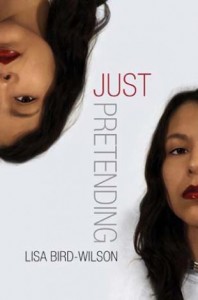 I read Lisa Bird-Wilson’s Just Pretending in May, starting it while we were visiting Winnipeg, and just after reading Pat Barker’s Union Street, a collection that situates the lives of working-class English women similarly to how Bird-Wilson presents First Nations women in Canada. At the time, we were promoting The M Word and it was Mother’s Day, so Bird-Wilson’s themes of motherhood resonated with me, and complicated my own understanding of these themes in my comfy middle-class context. The stories in Just Pretending portray “the wholeness of marginalized women’s experiences, experiences which hinge on maternity, on motherhood and daughterhood, and on what happens when these connections are broken,” and they’re so important now with untold stories of Canada’s Indigenous women’s experiences finally being brought to (some) light.
I read Lisa Bird-Wilson’s Just Pretending in May, starting it while we were visiting Winnipeg, and just after reading Pat Barker’s Union Street, a collection that situates the lives of working-class English women similarly to how Bird-Wilson presents First Nations women in Canada. At the time, we were promoting The M Word and it was Mother’s Day, so Bird-Wilson’s themes of motherhood resonated with me, and complicated my own understanding of these themes in my comfy middle-class context. The stories in Just Pretending portray “the wholeness of marginalized women’s experiences, experiences which hinge on maternity, on motherhood and daughterhood, and on what happens when these connections are broken,” and they’re so important now with untold stories of Canada’s Indigenous women’s experiences finally being brought to (some) light.
Purchase Just Pretending from McNally Robinson
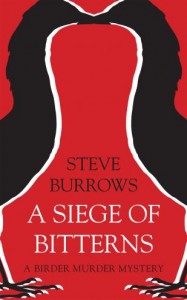 It was on Mother’s Day weekend that we visited Blue Heron Books in Uxbridge, the same day that Steve Burrows was appearing there to promote his book, A Siege of Bitterns. I was happy to buy a copy, as I’d been intrigued with his novel about a birdwatching detective, and I was so pleased to absolutely adore it. Unsurprisingly—the book has received rave reviews. The crux to the mystery’s solution involved not just birdwatching, but grammar. This book is a geek’s paradise. I’ve also been pleased to have happy readers reporting back after following my recommendation for this one. And good news: Burrows next title in the Birder Murder Mystery series is A Pitying of Doves, out this spring. I am so excited.
It was on Mother’s Day weekend that we visited Blue Heron Books in Uxbridge, the same day that Steve Burrows was appearing there to promote his book, A Siege of Bitterns. I was happy to buy a copy, as I’d been intrigued with his novel about a birdwatching detective, and I was so pleased to absolutely adore it. Unsurprisingly—the book has received rave reviews. The crux to the mystery’s solution involved not just birdwatching, but grammar. This book is a geek’s paradise. I’ve also been pleased to have happy readers reporting back after following my recommendation for this one. And good news: Burrows next title in the Birder Murder Mystery series is A Pitying of Doves, out this spring. I am so excited.
Purchase A Siege of Bitterns from McNally Robinson
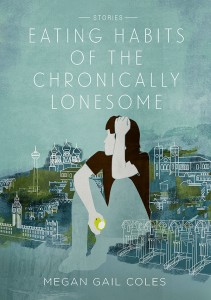 I’m so grateful to the good people at All Lit Up, without whom I might never have discovered Megan Gail Coles and her story collection Eating Habits of the Chronically Lonesome. Which contains this paragraph: “The reason Garry did these things was ’cause he couldn’t afford any better. Half of what he earned over at Pretty Paws was carted off to Newfoundland. Child support for an autistic kid he had with Slutty Marie down Gilbert Street, this the result of a one night stand./ Have you ever heard a sadder story, Dame? I mean, really? I barely poked her. We weren’t even lying down. It’s like her body sucked me sperm right inside her that night, vacuum cunt on her. Don’t ever have a go at the neighbourhood whore in an alley. Nothing good will come of it.” How could you not want to read this book?
I’m so grateful to the good people at All Lit Up, without whom I might never have discovered Megan Gail Coles and her story collection Eating Habits of the Chronically Lonesome. Which contains this paragraph: “The reason Garry did these things was ’cause he couldn’t afford any better. Half of what he earned over at Pretty Paws was carted off to Newfoundland. Child support for an autistic kid he had with Slutty Marie down Gilbert Street, this the result of a one night stand./ Have you ever heard a sadder story, Dame? I mean, really? I barely poked her. We weren’t even lying down. It’s like her body sucked me sperm right inside her that night, vacuum cunt on her. Don’t ever have a go at the neighbourhood whore in an alley. Nothing good will come of it.” How could you not want to read this book?
Purchase Eating Habits of the Chronically Lonesome from McNally Robinson
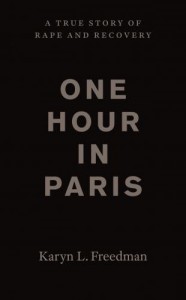 Unfortunately, as 2014 progressed, Karyn L. Freedman’s One Hour in Paris: A True Story of Rape and Recovery only became more and more important. I read it last spring as I pushed my baby in a swing. “The world, [Freedman] tells us with two decades of perspective in addition to her own violent rape, is a dangerous place for women, as statistics demonstrate in places as close as our own neighbourhoods and as far away as the war-wracked Congo. But nobody talks about these experiences, suggesting that such incidents are rare, suggesting to those lucky enough to not know better that sexual violence is a crime of circumstance, that it’s something most of us should be able to sidestep. It’s why newspaper columnists suggest that if a young woman refrains from drinking to excess, she might not get raped, and if she is raped, she should have known better. Thereby perpetuating victim’s sense of her own complicity in the crime against her, ensuring her silence, and so the cycle continues.” I’m so pleased that this book has been shortlisted for the BC National Non-Fiction Award.
Unfortunately, as 2014 progressed, Karyn L. Freedman’s One Hour in Paris: A True Story of Rape and Recovery only became more and more important. I read it last spring as I pushed my baby in a swing. “The world, [Freedman] tells us with two decades of perspective in addition to her own violent rape, is a dangerous place for women, as statistics demonstrate in places as close as our own neighbourhoods and as far away as the war-wracked Congo. But nobody talks about these experiences, suggesting that such incidents are rare, suggesting to those lucky enough to not know better that sexual violence is a crime of circumstance, that it’s something most of us should be able to sidestep. It’s why newspaper columnists suggest that if a young woman refrains from drinking to excess, she might not get raped, and if she is raped, she should have known better. Thereby perpetuating victim’s sense of her own complicity in the crime against her, ensuring her silence, and so the cycle continues.” I’m so pleased that this book has been shortlisted for the BC National Non-Fiction Award.
Purchase One Hour in Paris from McNally Robinson
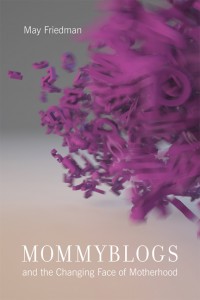 I read Mommyblogs and the Changing Face of Motherhood by May Friedman in September, and it was huge for me for all kinds of reasons. It laid the framework for the latest session of my blogging course, convinced me of the usefulness of academic theory for the very first time, and also that the history of women and blogging is one that is seriously under-documented and certainly worth telling. While Friedman’s research pertains to mommyblogs in particular (and her conclusions are always surprising, illuminating—if mommyblogs seem tired to you, she invites you to think again), it’s also hugely relevant to women and blogging in general, and is a fascinating and nuanced depiction of 21st century motherhood. And mostly, I am so struck by her notions of the usefulness of uncertainty (which reminded me of Rebecca Solnit, and ultimately led to cake): “In trying to form conclusions about mommybloggers—and about mothers—I am reminded of my children attempting to jump upon their own shadows: I am attempting to trap an essentially untrappable form of knowledge. After the initial discomfort and frustration that this inconclusive conclusion elicits, however, I have found that there is much to gained, as a researcher in general and as a motherhood researcher in particular, in looking instead at uncertainty as a valuable critical lens.” Feminism desperately needs this kind of approach, which is a fitting response to the complexity of actual people and the world.
I read Mommyblogs and the Changing Face of Motherhood by May Friedman in September, and it was huge for me for all kinds of reasons. It laid the framework for the latest session of my blogging course, convinced me of the usefulness of academic theory for the very first time, and also that the history of women and blogging is one that is seriously under-documented and certainly worth telling. While Friedman’s research pertains to mommyblogs in particular (and her conclusions are always surprising, illuminating—if mommyblogs seem tired to you, she invites you to think again), it’s also hugely relevant to women and blogging in general, and is a fascinating and nuanced depiction of 21st century motherhood. And mostly, I am so struck by her notions of the usefulness of uncertainty (which reminded me of Rebecca Solnit, and ultimately led to cake): “In trying to form conclusions about mommybloggers—and about mothers—I am reminded of my children attempting to jump upon their own shadows: I am attempting to trap an essentially untrappable form of knowledge. After the initial discomfort and frustration that this inconclusive conclusion elicits, however, I have found that there is much to gained, as a researcher in general and as a motherhood researcher in particular, in looking instead at uncertainty as a valuable critical lens.” Feminism desperately needs this kind of approach, which is a fitting response to the complexity of actual people and the world.
Purchase Mommyblogs and the Changing Face of Motherhood from McNally Robinson
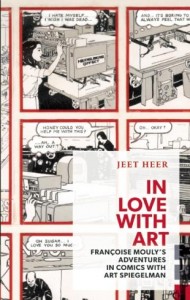 I remember reading In Love With Art by Jeet Heer on one of the first few days this spring when it was warm enough outside to walk and read without mittens, or it’s possible that it wasn’t actually that warm, but I was just enjoying the book so much. Francoise Mouly is a fascinating biographical subject, and I’d never heard of her, but unbeknownst to me, I’d seen her work—she was a long-time Art Editor of The New Yorker, and she’s the founder and Editorial Director of TOON Books, whose books we’re in love with at our house. And thisbook found its way into my (cold) hands just as Harriet was started to really get into comics, so I was pleased to learn so much about comics as an art form, and also the process behind comics creation, and what is entailed by the role of their editor. It was an excellent book, part of Coach House Books’ Exploded Views series of short books about big things, and I do love me a paperback that fits in my pocket.
I remember reading In Love With Art by Jeet Heer on one of the first few days this spring when it was warm enough outside to walk and read without mittens, or it’s possible that it wasn’t actually that warm, but I was just enjoying the book so much. Francoise Mouly is a fascinating biographical subject, and I’d never heard of her, but unbeknownst to me, I’d seen her work—she was a long-time Art Editor of The New Yorker, and she’s the founder and Editorial Director of TOON Books, whose books we’re in love with at our house. And thisbook found its way into my (cold) hands just as Harriet was started to really get into comics, so I was pleased to learn so much about comics as an art form, and also the process behind comics creation, and what is entailed by the role of their editor. It was an excellent book, part of Coach House Books’ Exploded Views series of short books about big things, and I do love me a paperback that fits in my pocket.
Purchase In Love With Art from McNally Robinson
 I only read The Bookshop That Floated Away last week, but I was so taken by Sarah Henshaw’s book, and I think that I’ll continue to be as much. We’re planning at trip to the UK in the spring, and top of my list of things to do there is tracking down the book barge. It’s the ideal book for anyone who ever thought that opening a book on a boat sounded like a perfectly sensible idea, and I loved its unabashed oddness, the absurd adventure, and all the references to books and reading, and also to Victoria Sponge Cake.
I only read The Bookshop That Floated Away last week, but I was so taken by Sarah Henshaw’s book, and I think that I’ll continue to be as much. We’re planning at trip to the UK in the spring, and top of my list of things to do there is tracking down the book barge. It’s the ideal book for anyone who ever thought that opening a book on a boat sounded like a perfectly sensible idea, and I loved its unabashed oddness, the absurd adventure, and all the references to books and reading, and also to Victoria Sponge Cake.
Purchase The Bookshop That Floated Away
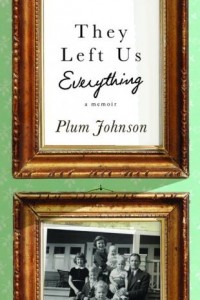 Plum Johnson’s They Left Us Everything was the most terrific memoir, ostensibly the story of a woman cleaning out her parents’ house after their deaths, but it’s also a record of a wonderful family history, about the curious shape and contents of archives and the stories they tell, about caring for aging parents, coming to terms with the past, the complexities of daughterhood and motherhood, and understanding our parents as people in their own right. I’m so pleased that it’s been nominated for the 2015 Charles Taylor Prize for Non-Fiction.
Plum Johnson’s They Left Us Everything was the most terrific memoir, ostensibly the story of a woman cleaning out her parents’ house after their deaths, but it’s also a record of a wonderful family history, about the curious shape and contents of archives and the stories they tell, about caring for aging parents, coming to terms with the past, the complexities of daughterhood and motherhood, and understanding our parents as people in their own right. I’m so pleased that it’s been nominated for the 2015 Charles Taylor Prize for Non-Fiction.
Purchase They Left Us Everything from McNally Robinson
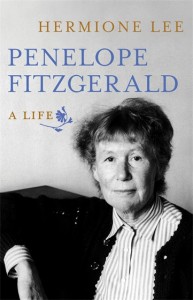 Hermione Lee’s biography, Penelope Fitzgerald: A Life, was the first book I finished in 2014, and it was how I spent my holidays—so so delightful. And anti-social. Biographers don’t come much better than Lee, and lives are rarely more interesting than Penelope Fitzgerald’s—though hers did pose a challenge for the biographer considering that all her early papers were lost when her houseboat sunk on the Thames during the 1960s (where she was living in abject poverty, barely supporting her three children. She went on to publisher her first book at age 60, won the Booker Prize at 7o). Fitzgerald’s novels had always seemed obscure to me, but their author’s life story has cast them in a new light (and I am excited for the new editions with covers by Julie Morstad).
Hermione Lee’s biography, Penelope Fitzgerald: A Life, was the first book I finished in 2014, and it was how I spent my holidays—so so delightful. And anti-social. Biographers don’t come much better than Lee, and lives are rarely more interesting than Penelope Fitzgerald’s—though hers did pose a challenge for the biographer considering that all her early papers were lost when her houseboat sunk on the Thames during the 1960s (where she was living in abject poverty, barely supporting her three children. She went on to publisher her first book at age 60, won the Booker Prize at 7o). Fitzgerald’s novels had always seemed obscure to me, but their author’s life story has cast them in a new light (and I am excited for the new editions with covers by Julie Morstad).
Purchase Penelope Fitzgerald: A Life from McNally Robinson
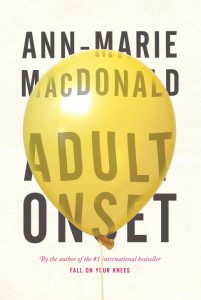 And oh! Adult Onset by Ann-Marie MacDonald, the book that inspired me to write over 1300 words in response. I love how this book has been everything to everybody—I read the review that said it was about anxiety, the one that said it was about being queer, and to me it was all about motherhood. What a fascinating book that can be read through so many different lenses. I also am intrigued by the weird and wonderful ways Adult Onset flirts with genre, oh so subtly. It’s a book about parallel lives and parallel universes, ordinary city sidewalks rendered fantastic.
And oh! Adult Onset by Ann-Marie MacDonald, the book that inspired me to write over 1300 words in response. I love how this book has been everything to everybody—I read the review that said it was about anxiety, the one that said it was about being queer, and to me it was all about motherhood. What a fascinating book that can be read through so many different lenses. I also am intrigued by the weird and wonderful ways Adult Onset flirts with genre, oh so subtly. It’s a book about parallel lives and parallel universes, ordinary city sidewalks rendered fantastic.
Purchase Adult Onset by McNally Robinson
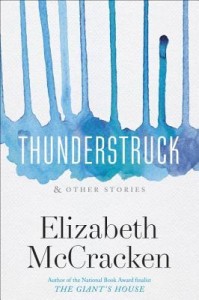 Speaking of sidewalks, I still remember walking up Bay Street toward the subway in August reading Thunderstruck and Other Stories by Elizabeth McCracken, a hardback no-less. I was hooked from the first delicious sentence: “Just west of Boston, just north of the turnpike, the ghost of Missy Goodby sleeps curled up against the cyclone fence at the dead end of Winter Terrace, dressed in a pair of ectoplasmic dungarees.” I loved this book, and its stories: “Many of them are about grief, about the peculiarity of details during the times in life in which we’re grief-struck, or stricken at all. They’re about human connection in surprising places, about misunderstandings in which the connection is missed. Their about the things that get lost and what we choose to preserve. They’re funny even with the sadness, a many sided shape. And they’re absolutely extraordinary.”
Speaking of sidewalks, I still remember walking up Bay Street toward the subway in August reading Thunderstruck and Other Stories by Elizabeth McCracken, a hardback no-less. I was hooked from the first delicious sentence: “Just west of Boston, just north of the turnpike, the ghost of Missy Goodby sleeps curled up against the cyclone fence at the dead end of Winter Terrace, dressed in a pair of ectoplasmic dungarees.” I loved this book, and its stories: “Many of them are about grief, about the peculiarity of details during the times in life in which we’re grief-struck, or stricken at all. They’re about human connection in surprising places, about misunderstandings in which the connection is missed. Their about the things that get lost and what we choose to preserve. They’re funny even with the sadness, a many sided shape. And they’re absolutely extraordinary.”
Purchase Thunderstruck from McNally Robinson
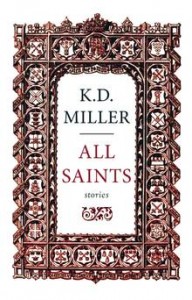 Last summer I reviewed All Saints by KD Miller in The Globe and Mail. “Most of [Miller’s characters] are searching for meaning; Miller – in language that doesn’t draw attention to itself, but bends to suit her purposes – uses the small moments in life to illuminate big questions. Where did the story start? What is destiny? Is there an order to the universe, to a life? But a life, we learn, is only a piece of the puzzle, meaning and wholeness only emerging when separate lives connect. Crucially and compellingly, such connections are mysterious – Miller shows how we are all figments of one and other’s imaginations.”
Last summer I reviewed All Saints by KD Miller in The Globe and Mail. “Most of [Miller’s characters] are searching for meaning; Miller – in language that doesn’t draw attention to itself, but bends to suit her purposes – uses the small moments in life to illuminate big questions. Where did the story start? What is destiny? Is there an order to the universe, to a life? But a life, we learn, is only a piece of the puzzle, meaning and wholeness only emerging when separate lives connect. Crucially and compellingly, such connections are mysterious – Miller shows how we are all figments of one and other’s imaginations.”
Purchase All Saints from McNally Robinson
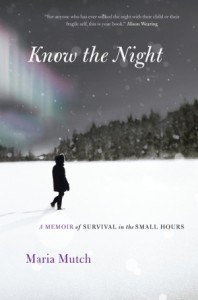 For a few weeks in February, I was deep into the memoir Know the Night by Maria Mutch, which I reviewed for The National Post, a book I read twice and puzzled through with so many notes, and figured out like a complicated math problem—so utterly engaging. All to the soundtrack of “Mercy Mercy Mercy” by Cannonball Adderley. “Know the Night, a memoir about a boy who doesn’t speak, is in love with language. Mutch’s prose is electric (when describing her relationship with her partner, she writes of “that ingredient vital for love, which can best be described, I think, as conspiracy” — my favourite line in the book) but the book is more concerned with words than the stories they tell. Mutch probes the connections between words and what they symbolize, as well as other connections for which words are a conduit.”
For a few weeks in February, I was deep into the memoir Know the Night by Maria Mutch, which I reviewed for The National Post, a book I read twice and puzzled through with so many notes, and figured out like a complicated math problem—so utterly engaging. All to the soundtrack of “Mercy Mercy Mercy” by Cannonball Adderley. “Know the Night, a memoir about a boy who doesn’t speak, is in love with language. Mutch’s prose is electric (when describing her relationship with her partner, she writes of “that ingredient vital for love, which can best be described, I think, as conspiracy” — my favourite line in the book) but the book is more concerned with words than the stories they tell. Mutch probes the connections between words and what they symbolize, as well as other connections for which words are a conduit.”
Purchase Know the Night from McNally Robinson
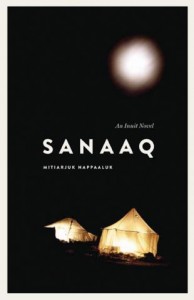 Another winter book I read around the same time was Sanaaq by Mitiarjuk Nappaaluk. Nappaaluk had been asked to write down some Inuktitut phrases for a missionary to learn, but didn’t stop at simple grammar exercises and went on invent a whole cast of characters and create the first Inuit novel. “The narrative skirts omniscience in a way that seems curious to the reader who is accustomed to the English novel. There is a matter-of-factness to the telling, perhaps related to its origins—it was written in a shorthand that can be written as quickly as it is spoken, and so this written novel has an oral nature. There is also a simplicity to its delivery that only comes across as such because a whole layer of the narrative is inaccessible to me as a reader (and I think that this is the challenge for this reader that Martin was writing about in her review). Saladin d’Anglure’s foreword makes clear that the apparent simplicity of Nappaaluk’s novel is undermined by the Inuit symbols and stories referenced, as well as details of Nappaaluk’s own life and members of her community. In short, this is only a straightforward story because I’m not smart enough to know it isn’t otherwise.”
Another winter book I read around the same time was Sanaaq by Mitiarjuk Nappaaluk. Nappaaluk had been asked to write down some Inuktitut phrases for a missionary to learn, but didn’t stop at simple grammar exercises and went on invent a whole cast of characters and create the first Inuit novel. “The narrative skirts omniscience in a way that seems curious to the reader who is accustomed to the English novel. There is a matter-of-factness to the telling, perhaps related to its origins—it was written in a shorthand that can be written as quickly as it is spoken, and so this written novel has an oral nature. There is also a simplicity to its delivery that only comes across as such because a whole layer of the narrative is inaccessible to me as a reader (and I think that this is the challenge for this reader that Martin was writing about in her review). Saladin d’Anglure’s foreword makes clear that the apparent simplicity of Nappaaluk’s novel is undermined by the Inuit symbols and stories referenced, as well as details of Nappaaluk’s own life and members of her community. In short, this is only a straightforward story because I’m not smart enough to know it isn’t otherwise.”
Purchase Sanaaq from McNally Robinson
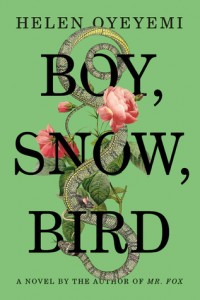 Helen Oyeyemi’s Boy Snow Bird was one of my vacation reads this summer, and I was enthralled by its twists and turns, and by how the British-born Oyeyemi channels American-ness in this novel. That it was based on a fairy tale might have had me supposing a certain shallowness to the narrative, but Oyeyemi drills down deep to show why an archetypal story like Snow White has such cultural resonance, and then introduces race as a theme to add a whole new layer of relevance. This novel was smart, sharp and gorgeous.
Helen Oyeyemi’s Boy Snow Bird was one of my vacation reads this summer, and I was enthralled by its twists and turns, and by how the British-born Oyeyemi channels American-ness in this novel. That it was based on a fairy tale might have had me supposing a certain shallowness to the narrative, but Oyeyemi drills down deep to show why an archetypal story like Snow White has such cultural resonance, and then introduces race as a theme to add a whole new layer of relevance. This novel was smart, sharp and gorgeous.
Purchase Boy, Snow, Bird from McNally Robinson
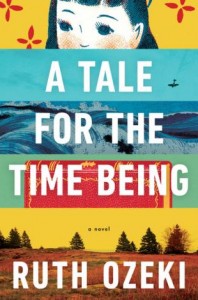 I also adored Ruth Ozeki’s A Tale for the Time Being, which I read in April. Late to the party (because it had already been internationally celebrated by then) I read it for own pleasure, and realized it deserved all the hype. At heart, this is a novel about quantum physics, which shouldn’t scare you off. It’s a weird, wonderful story about the whole wide world, which is as terrible as it is beautiful, and it’s brilliant how Ozeki manages to knit it all together.
I also adored Ruth Ozeki’s A Tale for the Time Being, which I read in April. Late to the party (because it had already been internationally celebrated by then) I read it for own pleasure, and realized it deserved all the hype. At heart, this is a novel about quantum physics, which shouldn’t scare you off. It’s a weird, wonderful story about the whole wide world, which is as terrible as it is beautiful, and it’s brilliant how Ozeki manages to knit it all together.
Purchase A Tale for the Time Being from McNally Robinson
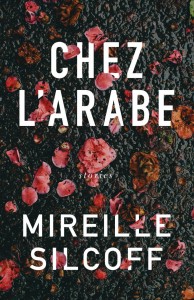 I haven’t talked much here about Chez L’Arabe by Mireille Silcoff, which I read this fall, but I loved it and my review is forthcoming in Canadian Notes & Queries. From my review: One can read Silcoff’s collection as a catalogue of beautiful well-made objects…Which is not to say that the stories lack depth, that they skim along their lush or shiny surfaces, but instead the things themselves are invested with meaning, each one “permeated with some little, important, imported world of its own.” “Materialist” is hurled as a slur more than once but, as a character replies (she of the sugar sifter), “I don’t see why anything should be considered less meaningful just because it’s concrete.””
I haven’t talked much here about Chez L’Arabe by Mireille Silcoff, which I read this fall, but I loved it and my review is forthcoming in Canadian Notes & Queries. From my review: One can read Silcoff’s collection as a catalogue of beautiful well-made objects…Which is not to say that the stories lack depth, that they skim along their lush or shiny surfaces, but instead the things themselves are invested with meaning, each one “permeated with some little, important, imported world of its own.” “Materialist” is hurled as a slur more than once but, as a character replies (she of the sugar sifter), “I don’t see why anything should be considered less meaningful just because it’s concrete.””
Purchase Chez L’Arabe from McNally Robinson
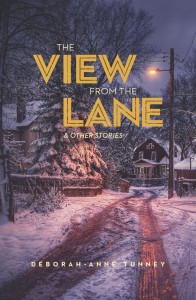 Deborah-Anne Tunney’s The View From the Lane was another recent read, but one I’ve not been able to shake off yet. It was a promising first book more than a perfect one, but a huge part of its promise is the atmosphere that Tunney creates. It reminded me of Atwood’s Cat’s Eye and Isabel Huggan’s The Elizabeth Stories in all the best ways. The night I finished this book, I stayed up late searching for the streets she writes about on Google Maps—I was left with such a sense of the place, and I wanted to see it for myself.
Deborah-Anne Tunney’s The View From the Lane was another recent read, but one I’ve not been able to shake off yet. It was a promising first book more than a perfect one, but a huge part of its promise is the atmosphere that Tunney creates. It reminded me of Atwood’s Cat’s Eye and Isabel Huggan’s The Elizabeth Stories in all the best ways. The night I finished this book, I stayed up late searching for the streets she writes about on Google Maps—I was left with such a sense of the place, and I wanted to see it for myself.
Purchase The View from the Lane by Deborah-Anne Tunney
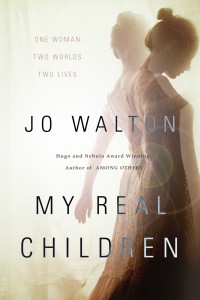 And finally, My Real Children by Jo Walton, a book I loved so very much and have given as a gift at least three times since I read it (and I replaced my ARC with a hardcover). Lots to say about this one—it connects interestingly with Lisa Bird-Wilson’s Just Pretending in its notion of real children (those we give birth to) as opposed to those who are miscarried or adopted and the “unrealness” that pervades these relationships through semantics. And with Ann-Marie MacDonald’s book, which also explores queer relationships and parallel lives. I reread this book for my book club and realized that while Walton’s strength is not as a prose stylist—there are a few lines in the book that are a bit painful to encounter—she has performed something remarkable in her creation of Patricia Cowan and her lives, so much so that this book reminded be of Hermione Lee’s Penelope Fitzgerald biography (Fitzgerald and Walton’s Patricia are near contemporaries). I’m going to be returning to this book again and again for the enthralling nature of its story, for its genre blurring and alternate histories, and for what Walton has to say about the shape and the details of an ordinary woman’s life.
And finally, My Real Children by Jo Walton, a book I loved so very much and have given as a gift at least three times since I read it (and I replaced my ARC with a hardcover). Lots to say about this one—it connects interestingly with Lisa Bird-Wilson’s Just Pretending in its notion of real children (those we give birth to) as opposed to those who are miscarried or adopted and the “unrealness” that pervades these relationships through semantics. And with Ann-Marie MacDonald’s book, which also explores queer relationships and parallel lives. I reread this book for my book club and realized that while Walton’s strength is not as a prose stylist—there are a few lines in the book that are a bit painful to encounter—she has performed something remarkable in her creation of Patricia Cowan and her lives, so much so that this book reminded be of Hermione Lee’s Penelope Fitzgerald biography (Fitzgerald and Walton’s Patricia are near contemporaries). I’m going to be returning to this book again and again for the enthralling nature of its story, for its genre blurring and alternate histories, and for what Walton has to say about the shape and the details of an ordinary woman’s life.
Purchase My Real Children from McNally Robinson






Thank you Kerry.